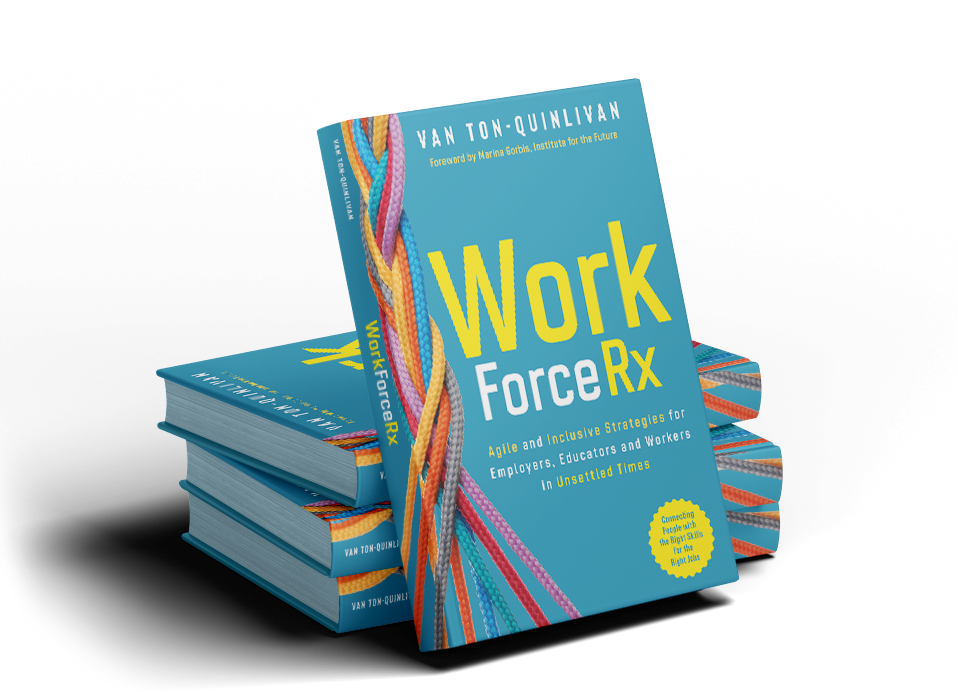Share this
The Reskilling Revolution: Fueling the Post-COVID Recovery
by Van Ton-Quinlivan on Sep 29, 2021
The numbers are startling: 10 million open jobs and 8.4 million unemployed. And even as the economy shows signs of recovery, the future is far from certain. The Delta variant and low vaccination rates threaten to undo what progress has been made, and while job openings are reaching record highs, a staggering 50% of employers report having jobs they can't fill. If these numbers tell us anything, it is that there remains a disconnect between what employers require, what employers are offering, and what workers want.
Even before the pandemic, the nature of work was undergoing dramatic changes. Driven by the ever-increasing rate of technological innovation and the growth of the gig economy, millions of freelance, independent, and platform-based workers were eagerly abandoning the traditional work week in favor of the freedom of self-employment. At the same time, the middle-skills job gap was turning into a chasm as employers across the country struggled to find employees with the right skills. In California alone, this gap was projected to reach nearly 1.5 million jobs by 2025 prior to the pandemic.
COVID-19 has made many of these problems more pronounced while also further altering the terrain of work, widening the gap between employment needs and job readiness, expanding remote opportunities, introducing questions of safety and security, and shifting our attention away from work-life balance to work-life integration.
Pre-pandemic, the World Economic Forum called for a global reskilling revolution. That call has only gotten stronger. Recently, Gallup conducted the most comprehensive study to date on upskilling --'The American Upskilling Study: Empowering Workers for the Jobs of Tomorrow. The survey found that upskilling is becoming a sought-after employee benefit and powerful attraction tool for employers amid the current labor shortage.
Upskilling is not a new concept, but it is one that has been consistently overlooked. I learned this firsthand when, after my tenure as executive vice chancellor with the California Community Colleges, I served as executive-in-residence with the Institute for the Future, where I had the opportunity to work with a dozen chief human resource officers (CHROs) in Silicon Valley as they wrestled with workforce and operational dilemmas. One CHRO grappled with having to fire current engineers so that the company could hire cloud engineers as it moved to a cloud-based strategy. He had never considered working with an education partner to develop an upskilling course that could close the gap created by this technology shift. That lack of consideration would have not just cost his company time and resources but also dozens of people their jobs. When faced with a talent puddle (as opposed to a pipeline), upskilling, clearly, is a better solution.
Stories like these form the backbone of my new book, WorkforceRx: Agile and Inclusive Strategies for Employers, Educators and Workers in Unsettled Times, in which I outline the playbooks needed to connect education, competencies, and credentials as more adults turn to upskilling and credentialling at a moment when degree-attainment seems too far-removed from current realities. The book also contains perspectives from some of the leading experts in workforce, education, and government while presenting solutions to workforce challenges from the diverse perspectives of employers, educators, policymakers, workers, and more. If we want to build successful strategies that will ease the workforce crisis, they all need to be involved.

On October 6 and 7, I'll be joined by dozens of esteemed authorities in workforce development, many of whom are mentioned in the book, to examine the forces that can support higher education, credentialing, workforce development, diversity, and more. I'm pleased to be chatting with:
- Earl Buford, Chief Executive Officer of Council on Adult Experiential Learning
- Chauncy Lennon, Vice President of Lumina Foundation
- Amrit Ahluwalia, Editor of EvoLLLution
- Carole Goldsmith, President of Fresno City College
- Rock Pfotenhauer, Chair of the Bay Area Community College Consortium
- Jim Caldwell, Chief Executive Officer of Workforce Incubator
- Rajinder Gill, CEO and Co-Founder, Essential Skills Program
- Steve Wright, ICT Statewide Director with the California Community Colleges
- And many others
RSVP for the virtual events with the above experts to learn more about formalizing the credential effort. If you'd like to discuss additional strategies for supporting adult learners, please register to attend the CAEL Annual Conference where I will be in attendance. WorkforceRx: Agile and Inclusive Strategies for Employers, Educators and Workers in Unsettled Times is available at mastercatalyst.org and amazon.com. All proceeds go to benefit Futuro Health's nonprofit mission.

Van Ton-Quinlivan is CEO of Futuro Health, whose mission is to grow the health and wealth of communities by growing the largest network of allied health workers. Her distinguished career spans the private, public, and nonprofit sectors. Van is former executive vice chancellor of the California Community Colleges and a White House Champion of Change.
Share this
- Adult Learner Success (113)
- CAEL Members (81)
- Success Stories (80)
- Workforce Development (66)
- Credit for Prior Learning (61)
- Best Practices (52)
- Impact (45)
- Career Pathways Support (38)
- Strategic Partnerships (34)
- Work-based Learning (31)
- Upskilling and Reskilling (27)
- Trends in Higher Education (26)
- Curation (22)
- Inclusion (20)
- Q&A (20)
- Policy (18)
- Retention and Completion (18)
- Talent Management (18)
- Adult Learner 360 (16)
- Research (14)
- Short-term Credentials (13)
- Military-connected Learners (11)
- Student support (11)
- Competency Based Education (CBE) (10)
- Adult Learner Academy (9)
- Transfer Students (9)
- Enrollment (8)
- Student Stories (8)
- Education Benefits (7)
- Experiential Learning (7)
- Featured (6)
- HSIs (6)
- In the news (6)
- NACTEL (6)
- Online Learning (6)
- Case Studies (5)
- Community colleges (5)
- EPCE (5)
- Guest blog (5)
- Wraparound Support (5)
- Apprenticeships (4)
- COVID-19 (3)
- Future of work (3)
- HBCUs (3)
- Structural Approaches to Learning (3)
- Accelerated Program (2)
- Credit Predictor Pro (2)
- Student parents (2)
- Tuition (2)
- Comebackers (1)
- Skills-based hiring (1)
- Upcoming (1)
- April 2025 (3)
- March 2025 (8)
- February 2025 (8)
- January 2025 (5)
- December 2024 (5)
- November 2024 (4)
- October 2024 (8)
- September 2024 (7)
- August 2024 (10)
- July 2024 (9)
- June 2024 (8)
- May 2024 (11)
- April 2024 (5)
- March 2024 (7)
- February 2024 (5)
- January 2024 (7)
- December 2023 (10)
- November 2023 (7)
- October 2023 (3)
- September 2023 (4)
- August 2023 (3)
- July 2023 (5)
- June 2023 (8)
- May 2023 (9)
- April 2023 (5)
- March 2023 (6)
- February 2023 (5)
- January 2023 (3)
- December 2022 (4)
- November 2022 (7)
- October 2022 (7)
- September 2022 (6)
- August 2022 (6)
- July 2022 (4)
- June 2022 (6)
- May 2022 (4)
- April 2022 (4)
- March 2022 (3)
- February 2022 (5)
- January 2022 (5)
- December 2021 (4)
- November 2021 (2)
- October 2021 (8)
- September 2021 (4)
- August 2021 (4)
- July 2021 (2)
- June 2021 (6)
- May 2021 (5)
- April 2021 (9)
- March 2021 (8)
- February 2021 (5)
- January 2021 (4)
- December 2020 (4)
- November 2020 (3)
- October 2020 (6)
- September 2020 (2)
- August 2020 (1)
- July 2020 (4)
- May 2020 (2)
- April 2020 (1)
- March 2020 (2)
- February 2020 (2)
- January 2020 (3)
- December 2019 (2)
- July 2019 (1)
- May 2019 (1)
- February 2019 (1)
- January 2019 (1)
- October 2018 (4)
- September 2018 (1)
- August 2018 (1)
- July 2018 (1)
- May 2018 (1)
- April 2018 (2)
- March 2018 (1)
- February 2018 (2)
- September 2017 (1)
- August 2017 (2)
- July 2017 (5)
- June 2017 (4)
- May 2017 (3)
- March 2017 (1)
- February 2017 (4)
- December 2016 (3)
- November 2016 (1)
- October 2016 (3)
- August 2016 (8)
- July 2016 (2)
- June 2016 (2)
- May 2016 (5)
- April 2016 (2)
- March 2016 (6)
- February 2016 (9)
- January 2016 (4)
- January 2015 (2)
